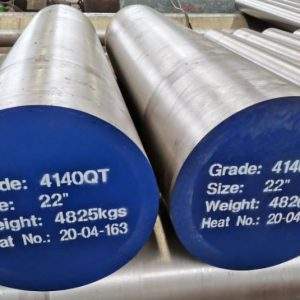Introduction

In the realm of modern engineering, materials play a pivotal role in determining the success and efficiency of various applications. Among these materials, 4140 steel stands out as a versatile and widely-used alloy, prized for its exceptional mechanical properties and adaptability to a myriad of industrial processes. In this comprehensive exploration, we delve into the unique characteristics of 4140 tool steel and its diverse applications across different sectors of engineering.
Understanding 4140 Steel: Composition and Properties
4140 steel, also known as AISI 4140 or SAE 4140, is a chromium-molybdenum alloy steel renowned for its high tensile strength, toughness, and excellent wear resistance. Its chemical composition typically includes:
- Chromium (Cr): 0.8 – 1.1%
- Molybdenum (Mo): 0.15 – 0.25%
- Carbon (C): 0.38 – 0.43%
- Manganese (Mn): 0.75 – 1.00%
- Silicon (Si): 0.15 – 0.35%
These elements contribute to the unique mechanical properties of 4140 steel, making it ideal for applications requiring high strength, such as aerospace components, automotive parts, industrial machinery, and oil and gas equipment.
Applications Across Industries
The versatility of 4140 tool steel extends across various industries, where its exceptional properties meet the demands of diverse engineering applications:
- Automotive Engineering: In the automotive sector, 4140 tool steel is utilized in the manufacturing of critical components such as crankshafts, gears, and axle shafts. Its high strength and fatigue resistance make it well-suited for withstanding the rigors of vehicle operation.
- Aerospace Engineering: Within aerospace engineering, 4140 tool steel finds application in structural components and landing gear due to its combination of strength and lightweight properties. Its ability to withstand high stress and impact loads ensures optimal performance in aircraft operations.
- Oil and Gas Industry: In the oil and gas sector, 4140 tool steel is favored for the fabrication of drill collars, pipelines, and valves. Its resistance to corrosion and ability to maintain mechanical properties under extreme temperatures and pressures make it indispensable for oil exploration and extraction operations.
- Industrial Machinery: Across various industrial machinery applications, 4140 tool steel is utilized in the production of shafts, gears, and tooling components. Its toughness and machinability enable efficient manufacturing processes while ensuring durability and reliability in service.
Mechanical Properties and Heat Treatment
The mechanical properties of 4140 tool steel can be further enhanced through heat treatment processes such as quenching and tempering. By carefully controlling the cooling and reheating cycles, engineers can achieve desired hardness, strength, and toughness levels to meet specific application requirements. The table below illustrates the mechanical properties of 4140 tool steel under different heat treatment conditions:

| Heat Treatment | Hardness (HRC) | Tensile Strength (MPa) | Yield Strength (MPa) | Elongation (%) |
|---|---|---|---|---|
| Annealed | 20 – 25 | 655 – 850 | 415 – 655 | 25 – 20 |
| Normalized | 28 – 32 | 770 – 1030 | 435 – 835 | 22 – 15 |
| Quenched & Tempered (300°C) | 58 – 62 | 1020 – 1245 | 850 – 1000 | 15 – 5 |
Conclusion
In conclusion, the widespread adoption of 4140 steel in modern engineering is a testament to its exceptional properties and versatility. From automotive and aerospace applications to oil and gas exploration, this alloy continues to drive innovation and progress across diverse industries. By understanding its composition, properties, and applications, engineers can harness the full potential of 4140 steel to overcome engineering challenges and achieve remarkable feats.
FAQ
Q:What are the main advantages of using 4140 steel?
A:The main advantages include high strength, toughness, wear resistance, and versatility in various industrial applications.
Q:Can 4140 steel be welded?
A:Yes, 4140 steel can be welded using conventional welding techniques, although preheating and post-weld heat treatment may be necessary to prevent cracking and maintain mechanical properties.
Q:What are the limitations of 4140 steel?
A:While 4140 steel offers excellent mechanical properties, it may exhibit lower corrosion resistance compared to stainless steels in certain environments. Additionally, careful attention to heat treatment is required to avoid brittleness and ensure optimal performance.
Q:Is 4140 steel suitable for high-temperature applications?
A:Yes, 4140 steel can withstand elevated temperatures up to a certain extent, making it suitable for applications where moderate heat resistance is required. However, for sustained high-temperature operation, other specialized alloys may be more appropriate.
Q:How does 4140 steel compare to other alloy steels?
A:Compared to similar alloy steels, such as 4130 and 4340, 4140 steel offers a balanced combination of strength, toughness, and affordability, making it a preferred choice for a wide range of engineering applications.
Through this blog, we hope to have provided valuable insights into the versatility and significance of 4140 steel in modern engineering practices. As technology advances and new challenges emerge, the enduring appeal of this remarkable alloy continues to shape the future of engineering innovation.
